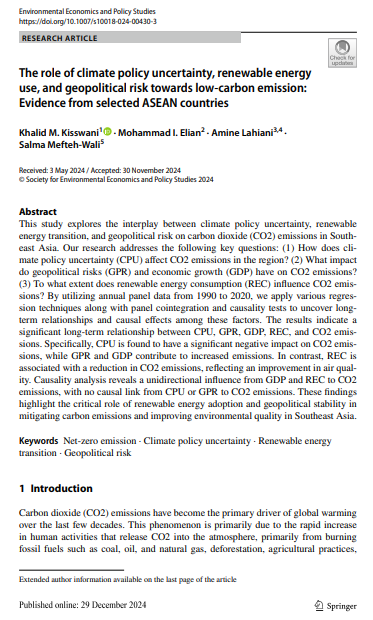
Keyword(s)
Author(s)
Khalid M. Kisswani, Mohammad I. Elian, Amine Lahiani, Salma Mefteh-Wali
Country(ies)
Publisher
Published Date
Access
DOI
This study explores the interplay between climate policy uncertainty, renewable energy transition, and geopolitical risk on carbon dioxide (CO2) emissions in Southeast Asia. Our research addresses the following key questions: (1) How does climate policy uncertainty (CPU) affect CO2 emissions in the region? (2) What impact do geopolitical risks (GPR) and economic growth (GDP) have on CO2 emissions? (3) To what extent does renewable energy consumption (REC) influence CO2 emissions? By utilizing annual panel data from 1990 to 2020, we apply various regression techniques along with panel cointegration and causality tests to uncover long-term relationships and causal effects among these factors. The results indicate a significant long-term relationship between CPU, GPR, GDP, REC, and CO2 emissions. Specifically, CPU is found to have a significant negative impact on CO2 emissions, while GPR and GDP contribute to increased emissions. In contrast, REC is associated with a reduction in CO2 emissions, reflecting an improvement in air quality. Causality analysis reveals a unidirectional influence from GDP and REC to CO2 emissions, with no causal link from CPU or GPR to CO2 emissions. These findings highlight the critical role of renewable energy adoption and geopolitical stability in mitigating carbon emissions and improving environmental quality in Southeast Asia.